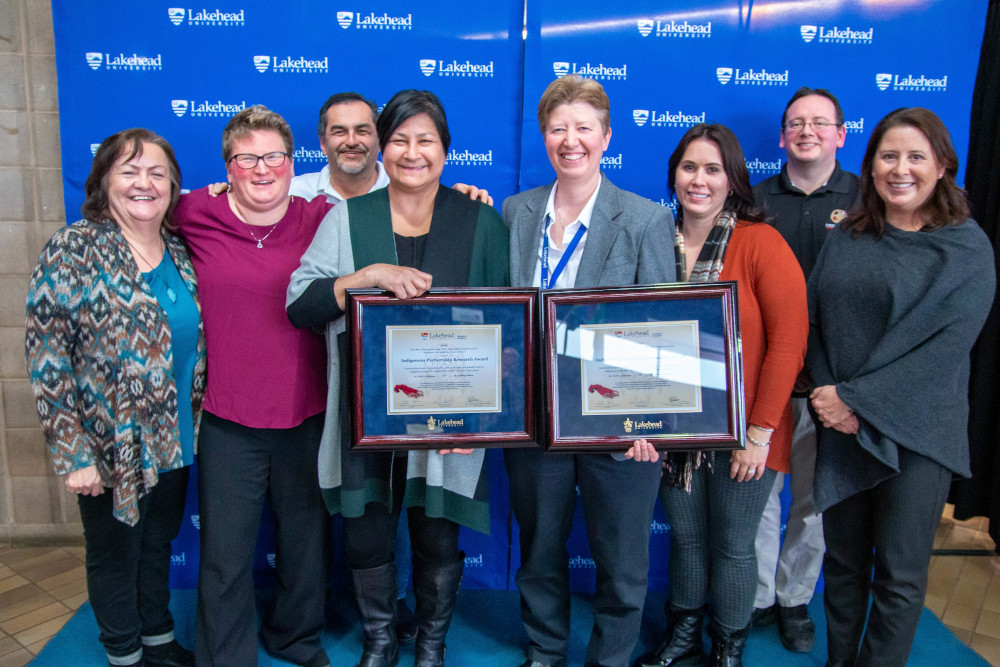Press Release: TBT News & Dr. Vicki Kristman share funding announcement with local community
Please click HERE to view news clip and interview with Institute Director, Dr. Vicki Kristman.
Please click HERE to view news clip and interview with Institute Director, Dr. Vicki Kristman.
EPID@Work is delighted to share the news that the Ontario government is investing over $5 Million in Health and Safety Research conducted at the Institute.
This funding will help improve workplace safety, prevent injuries and reduce mental health stigma in the workplace.
Please click HERE to view the official news release:
Dr. Vicki Kristman
April 14, 2022
THUNDER BAY — The Ontario government is working for workers by investing $5.5 million in ground-breaking workplace health and safety research led by the Enhancing Prevention of Injury and Disability @ Work (EPID@Work) Research Institute at Lakehead University. The funding will contribute to the Institute’s leading research in several key areas including, reducing mental health stigma in the workplace and designing injury prevention programs for vulnerable workers in Northwestern Ontario.
“Every worker in Northern Ontario should feel safe and supported on the job, and they deserve to come home safe to their loved ones after a hard day’s work,” said Monte McNaughton, Minister of Labour, Training and Skills Development. “Our government is working for workers by proudly investing in the EPID@Work Research Institute at Lakehead University so they can deliver solutions that will create lasting improvements to worker safety.”
Research shows vulnerable workers are often at increased risk of workplace injury as they face challenges accessing conventional workplace health and safety resources and training. EPID@Work’s research will aim to identify and address these barriers.
As part of this five-year project, the EPID@Work Research Institute will help employers in Northern Ontario reduce mental health stigma in their workplaces, improve support for workers, and ensure managers have the tools for the early identification of mental health symptoms. The funding will also contribute to ongoing research to understand Indigenous workers’ experiences in Northern Ontario workplaces to provide them with better mental health support and prevent injuries on the job.
“Lakehead University is excited for the significant, long-term investment by the Ministry of Labour, Training and Skills Development in Dr. Kristman’s research and the EPID@Work Research Centre,” said Dr. Moira McPherson, President and Vice-Chancellor of Lakehead University. “Focussing on Northern Ontario’s workforce, with emphasis on Indigenous communities and equity seeking groups, the Center will conduct high-quality, community-based, transdisciplinary research in the areas of work-related injury, both physical and mental, and disability prevention.”
This investment is part of the government’s plan to build a future where Ontario is the best place to live, work and raise a family. This includes recently passing new legislation that provides historic new protections for workers, as well as releasing the province’s five-year health and safety strategy, Prevention Works.
Quick Facts
Additional Resources
-30-
|
|
MEDIA CONTACTS Harry Godfrey | ontario.ca/labour-news |
Ciara Nardelli |
|
The EPID@Work Research Institute is pleased to formally announce Dr. Kathy Sanderson, from the Faculty of Business Administration, as the Associate Director of the Institute. Dr. Sanderson brings a wealth of knowledge to the areas of workplace mental health and equity and diversity within the workplace. Institute members look forward to continued work with Kathy.
"EPID@Work is a dynamic centre that makes meaningful contributions to workplace research. I’m excited to take on this new role!"
-Dr. Kathy Sanderson
Lakehead University’s Dr. Kathy Sanderson is leading a Canadian team of researchers examining the diversity and vulnerability of care workers during and after the COVID-19 pandemic.
Please click HERE to read Lakehead University media release.
The Institute for Work & Health (IWH) is an independent, not-for-profit research organization whose mission is to promote, protect and improve the safety and health of working people by conducting actionable research that is valued by employers, workers and policy-makers.
IWH is currently seeking a qualified person to fill the position of Research Administrator.
Please click HERE to view current posting
We are looking for a highly motivated individual with knowledge and some experiences in doing mixed study. Funding for this position is made available through the Social Sciences and Humanities Research Council (SSHRC).
This position is available under the leadership of Dr. Manal Alzghoul, School of Nursing, and in association with Enhancing the Prevention of Injury and Disability (EPID) @ Work Research Institute.
For more details, please view posting on our opportunities page by clicking here.
Syme Research Training Awards Applications Now Being Accepted
The Institute for Work & Health is now accepting applications for its 12-month S. Leonard Syme Research Training Awards in Work and Health.
The awards are for young researchers at the master's or doctoral level intending to study work and health. Preference is given to candidates whose research interests closely align with IWH's current research and topic areas. IWH is particularly interested in candidates whose research addresses the prevention of work-related injury and illness, and the prevention and management of disability at work in Ontario. In the spirit of Dr. Syme's own contributions to research mentorship, candidates from any disciplinary background are eligible for training awards. A maximum of three smaller awards or one larger award may be offered. Awards are based on the merit of the research proposed.
The registration deadline for applications is April 29, 2022.
For more information about the awards and how to apply, please visit:
https://www.iwh.on.ca/opportunities/syme-award.
Enquiries should be directed to Lyudmila Mansurova: lmansurova@iwh.on.ca.
In November, 2020, Ms. Chelsea Noel joined the BRANCHES Lab and the EPID@Work groups at Lakehead University as a research assistant where she began working on an Injured Workers Community Legal Clinic-funded project. The focus of the project was on the experiences, impacts, and service needs of injured and ill workers in the WSIB progress in the City and District of Thunder Bay. Since that time, Ms. Noel has transitioned to a new role as an MA student in our clinical psychology program where she has been highly successful creating and disseminating this research. Specifically, Ms. Noel has presented this work to community stakeholders at the Thunder Bay and District Injured Workers Support Group, at academic conferences including the National Work Wellness Institute (WWi) (November 2021), the Disability and Work National Conference (December, 2021), and at the 2021 Canadian Psychological Association’s 82nd Annual Convention (June 2021), where her presentation won the Clinical Section Student Convention Registration Award. Her research is also submitted to the St Joseph's 2022 Showcase of Health Research (Feb 2022), and a full-length manuscript is under review (revise and resubmit) at a national public health journal. Ms. Noel has also prepared a range of KTMB products for broader dissemination and those products have had wide distribution and policy impact. Specifically, Ms. Noel's research brief (attached) was submitted to the Parliamentary Committee on Finance and Economic Affairs (Jan 10, 2022) as evidence for the need to increase funding for injured workers dependent on the WSIB system.
Mental health needs of workers in the WSIB claims and appeals processes in NW Ontario


From left, Lillian Calder, Councillor, Bingwi Neyaashi Anishinaabek; Robyn O'Loughlin, Postdoctoral Fellow, EPID@Work Research Institute, Lakehead University; Conway Lesperance, former Health and Safety Advisor, Nokiiwin Tribal Council; Audrey Gilbeau, Executive Director, Nokiiwin Tribal Council; Vicki Kristman, Director, EPID@Work Research Institute & Associate and Professor, Dept. of Health Sciences, Lakehead University; Tiffany Rogowski, Health, Safety and Wellness Advisor, Nokiiwin Tribal Council; Jeff Robert, Health and Safety Advisor, Nokiiwin Tribal Council received the Indigenous Research Partnership Award, presented by Denise Baxter, Vice-Provost, Indigenous Initiatives, Lakehead University, far right, at the 2020 Research Awards of Excellence ceremony hosted by Lakehead University.
January 27, 2022 – Thunder Bay, Ont.
Lakehead University researchers are receiving more than $2.1 million from the Canadian Institutes of Health Research for several important projects.
Dr. Vicki Kristman, Associate Professor in Health Sciences and Director of Lakehead’s Enhancing the Prevention of Injury and Disability (EPID) at Work Research Institute, is receiving $367,200 to evaluate the Wiiji app’s effectiveness in improving the mental health of Indigenous people in the workplace.
In partnership with the Nokiiwin Tribal Council, which consists of five communities, Dr. Kristman and her team will conduct this research for up to three years.
“There is a need to tailor mental health interventions to the needs of Canadian Indigenous people.” Dr. Kristman said.
“Indigenous individuals are less likely to seek help for mental health – this is a major concern among communities of the Nokiiwin Tribal Council,” said Audrey Gilbeau, Executive Director of the Nokiiwin Tribal Council.
Dr. Kristman said e-health interventions have shown success for several mental health-related conditions, including anxiety, depression, sleeping disorders and feelings associated with low self-worth.
“Yet, only one Australian study has started to explore the acceptability of e-mental health approaches among remote health service providers working with Indigenous populations, and no study has explored the possibility of e-mental health approaches for individual workers and managers within workplaces,” Dr. Kristman said.
With direction from the communities, members of the Nokiiwin Tribal Council and Dr. Kristman’s team developed an e-mental health app for Indigenous workplaces called 'Wiiji,' to improve Indigenous workplace mental health through a CIHR Catalyst Grant: Work Stress and Wellbeing Hackathon.
Wiiji provides information on work-related mental health and mental-health resources that Indigenous workers can access, and provides a mechanism to connect with a peer-support who can assist the worker in times of stress.
“The primary goal of this research is to evaluate the app for improvement in Indigenous workplace mental health. We will use a mixed-methods approach to conduct this study.”
Results of this project will help communities understand the impact of the app, and will provide insight into usage barriers and perceived effectiveness.
“If the app can assist workers, it may have the potential to increase Indigenous participation in employment, reduce work disability, and improve the mental health of the Indigenous population,” Dr. Kristman said.
“This will return economic and health benefits to Indigenous employers, communities, families, and individuals.”
Dr. Christopher Mushquash, Professor in Psychology and Canada Research Chair in Indigenous Mental Health and Addiction, and his team are receiving $344,250 to examine the relationship between adverse childhood experiences and various aspects of well-being.

Conducted for up to five years, this research will allow the team to create a knowledge base that Indigenous community-based organizations can use to better support members who are facing difficulties with mental health and addictions.
“Indigenous peoples in Canada experience more health difficulties compared to non-Indigenous populations and are more likely to have poorer access to factors that may reduce the impact of these disparities, such as continuous health services in remote or rural settings,” Dr. Mushquash said.
This project is in close collaboration with Meagan Drebit and Tina Bobinski at Dilico Anishinabek Family Care as well as staff and management at the Adult Residential Treatment Centre. The research team is co-led by CIHR Banting Postdoctoral Fellow, Dr. Elaine Toombs, and graduate trainees Jessie Lund and Abbey Radford.
Decades of research across non-Indigenous populations has identified that adverse childhood experiences are associated with poor health outcomes and increased risk for experiencing a range of chronic diseases.
“These adverse childhood experiences include abuse, neglect, and household challenges – such as intimate partner violence,” Dr. Mushquash said.
“However, the relationship between intergenerational trauma, adverse childhood experiences, and health outcomes among Indigenous peoples is understood in our communities but not as well-documented in the research literature.
“There is also a lack of research examining how factors such as cultural connectedness, community support, and resilience protect Indigenous adults who have a history of adverse childhood experiences,” he said.
Dr. Andrew P. Dean, Lakehead’s Vice-President, Research and Innovation, thanked the researchers for all of their hard work.
“Congratulations to each of our researchers for their outstanding success in obtaining CIHR grants,” he said.
“A number of these projects will have significant applications to addressing the health inequities and health challenges of people of Northern Ontario. Health and well-being is a priority research area for Lakehead University and these research projects emphasize the excellent and applied nature of researchers working at Lakehead University in this field.”
The Research Support Fund is a federal funding program for post-secondary institutions in Canada to support some of the costs associated with managing research funded by the Canadian Institutes of Health Research, Natural Sciences and Engineering Research Council, and Social Sciences and Humanities Research Council.
In 2020/21, Lakehead University received nearly $2 million in assistance from the Research Support Fund to support the indirect costs of research, which includes costs for supporting the management of intellectual property, research and administration, ethics and regulatory compliance, research resources, and research facilities.
New CIHR Grants 2020-21
Total: $2,146,928
Catalyst Grant – Patient-Oriented Research (one-year grant)
Dr. Chiachen Cheng, Faculty of Medicine, West Campus, “Canadian Network for Youth-Friendly Mental Health Services: Developing a Standard for Implementing, Evaluating, and Improving Youth-friendly Mental Health Services”, $97,085.
Team
Operating Grant: Knowledge Synthesis Grant: COVID-19 Rapid Research Funding Opportunity in Mental Health and Substance Use (one-year grant)
Dr. Kathryn Sinden, School of Kinesiology, “Protecting Those Who Protect Us: An Evaluation and Synthesis of Resources Deployed to Support the Mental Health of First Responders During COVID-19”, $49,968.
Team
Project Grants (three- to five-year grants)
Dr. Vicki Kristman, Department of Health Sciences, “Evaluating the Wiiji app to Improve Indigenous Workplace Mental Health: A Mixed-methods Approach”, $367,200.
Team
Dr. Christopher Mushquash, Department of Psychology, “Examining Adverse Childhood Experiences (ACEs) In A First Nations Treatment-Seeking Population”, $90,000.
Team
Dr. Christopher Mushquash, Department of Psychology, “Integrating Trauma-Informed Evaluation and Treatment of Adverse Childhood Experiences with a First Nations Treatment Seeking Population”, $344,250.
Team
Global Alliance for Chronic Disease (five-year grant)
Dr. Lana Ray, Department of Indigenous Learning, “The Waasegiizhig Nanaandawe'iyewigamig Mino-Bimaadiziwin Project: Cancer Prevention through Traditional Healing/Indigenous Approaches to Health as Best Practice: Primary and Secondary Prevention of Cancer”, $1,198,425.
Team
– 30 –
Media: For more information or interviews, please contact Brandon Walker, Media, Communications and Marketing Associate, at (807) 343-8110 ext. 8372 or mediarelations@lakeheadu.ca.
Lakehead University is a fully comprehensive university with approximately 9,700 full-time equivalent students and over 2,000 faculty and staff at two campuses in Orillia and Thunder Bay, Ontario. Lakehead has 10 faculties, including Business Administration, Education, Engineering, Graduate Studies, Health & Behavioural Sciences, Law, Natural Resources Management, the Northern Ontario School of Medicine, Science & Environmental Studies, and Social Sciences & Humanities. Lakehead University’s achievements have been recognized nationally and internationally, including being ranked, once again, among Canada’s Top 10 primarily undergraduate universities in Maclean’s 2021 University Rankings; as well as included in the top half of Times Higher Education's 2022 World Universities Rankings for the third consecutive year, and in the top 100 of 1,115 universities from around the world in THE's 2021 Impact Rankings (which assesses institutions against the United Nations’ 17 Sustainable Development Goals). Visit www.lakeheadu.ca.